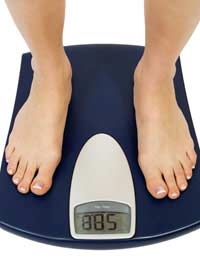Diagnosing Bulimia

Bulimia nervosa more commonly called bulimia is an eating disorder marked by binges and then purges. During a binge a bulimic will eat a great amount of food in one sitting, but then purge by either inducing vomiting or taking a laxative or diuretic to expel this food. For bulimics, binging and purging becomes a cycle but they may never lose, or gain, enough weight to make it obvious that they have an eating disorder. Damage to the digestive tract, mouth, teeth and salivary glands is common among bulimics and the constant binging and purging mean that bulimics rarely keep in enough vitamins and minerals to remain healthy. These factors can have serious and long-lasting health effects.
Signs of Bulimia
Though bulimia is often associated with low self-esteem and low self-confidence, it is the behaviours in which bulimics engage that marks their eating disorder to the external world. Bulimia is an eating disorder that manifests itself through binge eating followed by purging and these behaviours are the hallmark signs of this disorder. Many bulimics also engage in behaviours that become warning signs of bulimia such as:- Hiding the food reserved for binges (including bread, pasta, sweets, desserts, crisps and ice cream though any food can and is consumed during binges).
- Lying about what has been eaten.
- Binging in secret.
- Purging in secret.
- Hiding items such as laxatives or diuretics.
- Running the tap or bath while in the toilet to disguise purging episodes.
- Displaying deep concern for body weight, body shape and overall image.
- Frequently complaining of sore throats (brought on by repeated vomiting).
- Frequently complaining of dental problems (also brought on by repeated vomiting).
- Hiding behind loose or baggy clothing.
- Showing low or no sex drive.
Diagnosing Bulimia
Though bulimia is an eating disorder and thus wreaks havoc on physical health, it is diagnosed according to mental health criteria. Five standard criteria must be met for a diagnosis of bulimia, including binge eating, purging (including induced vomiting, the misuse of laxative, the misuse of diuretics, the misuse of enemas, fasting and/or excessive exercise), a cycle of binging and purging at least twice a week for three months, holding deep fears of weight gain and unrealistic ideas of a healthy weight, and the absence of anorexia. If an individual binges and purges during an episode of anorexia then (s)he is considered to be suffering from Binge and Purge Type Anorexia instead. However, if bulimia is diagnosed then a subtype will need to be determined. Purging Type Bulimia Nervosa is diagnosed when a bulimic purges to rid the body of food while Non-Purging Type Bulimia Nervosa is diagnosed when the bulimic does not engage in purging to rid the body of food but rather exercises or fasts excessively after a binge.Treating Bulimia
There is no single, recognised cure for bulimia, but there are a variety of treatment options. Each bulimic will work with mental health professionals to design a mixture of treatments to address all of his/her behaviours and concerns. Common treatment for bulimia include counselling/therapy, family counselling/therapy, cognitive behaviour therapy (to change food and eating behaviours), the use of support groups or group therapy, and nutritional counselling and planning. Rarely is medication used to treat bulimia unless it is prescribed to treat associated conditions such as depression. Further information on the diagnosis and treatment of bulimia should be obtained from a GP, private mental health professional or from the Eating Disorders Association and/or National Centre for Eating Disorders.
Related Articles in the 'Diagnosing' Category...


Re: Eating by Texture
i can't eat porridge, yogurt and the most types of meat. also i can't drink kefir and juices. i just can't stop gagging while eating/drinking…
Re: Colour Coded Eating
I eat all colors but I can't have more than one color in my mouth at a time, like I can't eat fruity pebbles there's too many colors that I…
Re: Eating by Texture
I need to understand my oroblem. Eating health is hard. I cant really diet due to food allergies and diabetes, but I have a lit of food…
Re: Eating Disorders and the Physical Signs
I’ve been to the gp several times but apparently I don’t look anorexic. I’m 5’3 and weigh around 49 kg. When I eat I…
Re: Dental Damage and Eating Disorders
If you're worried about your weight, eat healthy, research your ideal weight for your age, height and bone structure and…
Re: Eating by Texture
Hi I've avoided soft textured food forever. My father also & he has this full blown, only eats crunchy things. Over the decades it's got better…
Re: Recovering From Anorexia: How Do I Prevent Swollen Stomach?
My daughter is recovering from anorexia (34 hrs old - diagnosed 15 years ago) What do I…
Re: Eating by Texture
I don’t like most veg. The only raw veg I can eat is cucumber. Cooked, I like carrots, cauliflower, baby corn, onion (if it’s well cooked and/or…
Re: Pica Disorder
Potato Boy back. I was doing great for a while but then shelby left me for my dad. I was doing so good. My best friends had an intervention for me and…
Re: Why Does Eating Make Me Feel Sick?
I'm a 22 year old female who has been suffering with anorexia for four years. My fiance and I recently broke up, and I had…